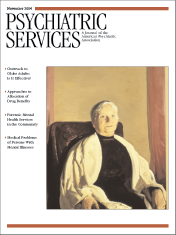Prevalence, Severity, and Co-occurrence of Chronic Physical Health Problems of Persons With Serious Mental Illness
Abstract
OBJECTIVES: This study examined Medicaid claims forms to determine the prevalence, severity, and co-occurrence of physical illness within a representative sample of persons with serious mental illness (N=147). METHODS: Representativeness of health problems in the study sample was established through comparison with a larger sample of persons with serious mental illness enrolled in Medicaid within the same state. Standardized annual costs were then assigned to Medicaid claims diagnoses, and individual health problem severity was measured as the sum of estimated treatment costs for diagnosed conditions. RESULTS: Seventy-four percent of the study sample (N=109) had been given a diagnosis of at least one chronic health problem, and 50 percent (N=73) had been given a diagnosis of two or more chronic health problems. Of the 14 chronic health conditions surveyed, chronic pulmonary illness was the most prevalent (31 percent incidence) and the most comorbid. Persons with chronic pulmonary illness were second only to those with infectious diseases in average annual cost of treatment ($8,277). Also, 50 percent or more of participants in eight other diagnostic categories had chronic pulmonary illness. A regression analysis identified age, obesity, and substance use disorders as significant predictors of individual health problem severity. CONCLUSIONS: Risk adjustment for physical health is essential when setting performance standards or cost expectations for mental health treatment. Excluding persons with chronic health problems from mental health service evaluations restricts generalizability of research findings and may promote interventions that are inappropriate for many persons with serious mental illness.



